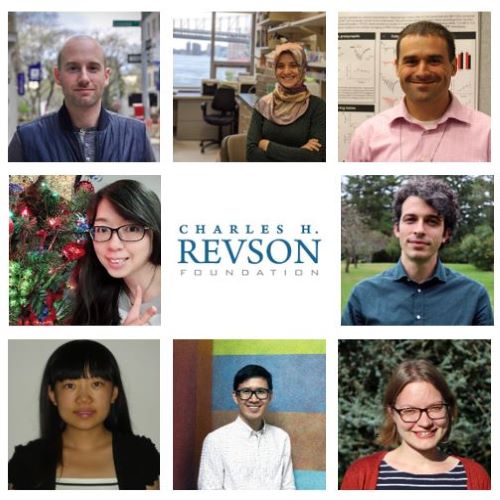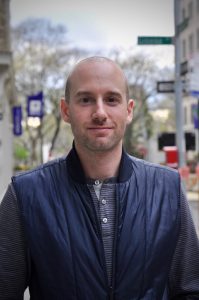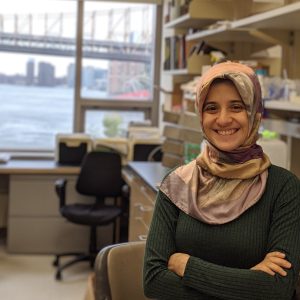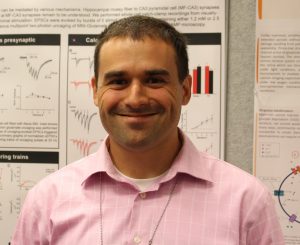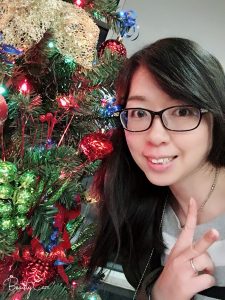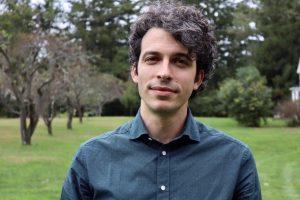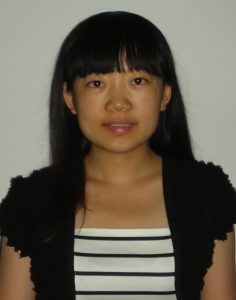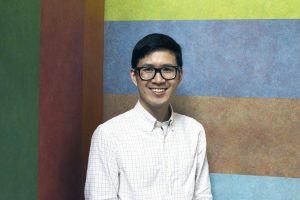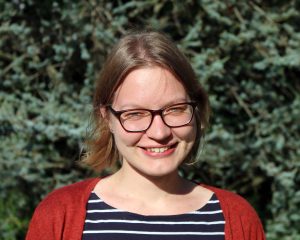Please welcome our Revson Fellowship class of 2019-2021!
Corey Baimel- New York University
Dr. Baimel’s research defines the role for circuit re-arrangements in specific sub-populations of motor spiny neurons during the response to cocaine. He received a B.Sc. in Physiology from McGill University, and then went on to receive his PhD in Pharmacology from the University of British Columbia.
“Why did you want to become a scientist and when did you know this was your path in life?”
I can’t pinpoint a specific time or event when I knew that I wanted to be a scientist. Like most scientific discoveries, the decision was the result of countless hours of work and thought. When I left high school, I chose to study science because I wanted to be an architect. But it didn’t take long for me to realize that I was far more interested in biology than I was in math or physics. And so I followed that interest in biology, and over time it shifted from biology to physiology, and then again from physiology to neuroscience. But it wasn’t until my last semester of my undergraduate degree that I realized science was something you could do, and not just something that you could learn. At a loss for what I wanted to do after graduation, a professor recommended I try working in a lab. So I did, and although it was daunting at first, over time I learned that in science you get to mix creativity with logic and reason, to pay attention to small details to answer big questions, and to be a part of a larger community, sharing ideas to work towards a common goal. I haven’t looked back since.
Hande Boyaci Selcuk– The Rockefeller University
Dr. Boyaci Selcuk’s research uses structural biology and biochemistry to examine transcription by the C. difficile RNA polymerase and to characterize the mechanism of inhibition of that polymerase by the antimicrobial Fidaxomicin. She received a B.S. in Chemistry from Bilkent University in Turkey and then received her PhD in Chemistry from Princeton University.
“Why did you want to become a scientist and when did you know this was your path in life?”
My interest in science began when I participated chemistry olympiads in high school. I enjoyed how you can see the underlying truth in things that we come across in our daily lives. In graduate school, I was introduced into biochemistry while studying a pathogenic bacteria, Vibrio cholerae. I liked the fact that you can make contributions to human health by basic science and decided to continue my studies in that field, studying transcription from Mycobacterium tuberculosis as a postdoc.
Simon Chamberland– New York University School of Medicine
Dr. Chamberland’s work investigates how cannabidiol (CBD) impacts a signaling pathway (LPI-GPR55) to regulate neuronal excitability. He received a Bachelor of Science in Biochemistry and a Master of Science in Biochemistry from the Université Laval in Québec. He later went on to receive his Doctor of Philosophy in Neuroscience from the Université Laval in Québec.
“Why did you want to become a scientist and when did you know this was your path in life?”
As far as I remember, I have always been fascinated by biology. As a child, I received a microscope as a gift and spent a lot of time looking at insect and plant samples to observe the fundamental elements that support life. But only much later did I understand that science was my path in life. During my bachelor degree, I did an internship and observed samples of neurons that were rendered fluorescent to reveal their complex but beautiful structure. I immediately knew that I wanted to understand how these cells work together to process information. This is still what motivates me everyday – trying to understand the complex interactions between neurons allowing us to interact with our environment.
Xiaoyun Dai– Yale School of Medicine
Dr. Dai’s work uses new methods of gene editing, based upon variant CRISPR systems, to engineer T cells to be more effective in immunotherapy. She received a B.S. in Biomedical Engineering from Sichuan Agricultural University and a M.S. in Cell Biology from Sichuan University. She later received her PhD in Pharmacology from the National University of Singapore.
“Why did you want to become a scientist and when did you know this was your path in life?”
When I first embarked on the scientific research path, my career goals were to become a college teacher. However, I found that I really enjoyed the logical thinking and problem solving aspects of science during my PhD training at NUS. By doing research, I can explore knowledge that is currently unknown to humans, which makes me very excited. I have been committed to studying targeted cancer therapy for 10 years. Seeing the success of cancer immunotherapies such as immune checkpoint inhibitors and chimeric antigen receptor T cells inspires me to dedicate myself to science throughout my life. I wish my efforts and persistence can benefit society in the future and bring hope to patients with advanced cancer.
Alessandro Furlan– Cold Spring Harbor Laboratory
Dr. Furlan’s research involves studying the role for neurons in regulating metabolic homeostasis, a key aspect of maintain body weight. He received a Bachelor degree in Biological Sciences from the University of Padova. He then went on to receive a Master degree in Neuroscience with honors from University of Trieste, and then his PhD from Karolinska Institute in Stockholm, Sweden.
“Why did you want to become a scientist and when did you know this was your path in life?”
As far as I can remember, I have always been fascinated with solving riddles. I believe that science, at its core, offers these in the context of real-world applications. When I began working in a laboratory during university, I experienced the thrill of answering these riddles as scientific discovery. During my PhD, I was lucky to work closely with outstanding scientists, and learned to appreciate that each one contributes different skillsets to solving these riddles and driving scientific discovery. This was when I decided to make science my path in life and work toward building and contributing my own skillset to the greater scientific community.
Haixing Li– Columbia University
Haixing Li obtained her B.S. in Physics from the University of Science and Technology of China in 2012 where she did her undergraduate thesis with Prof. Xianhui Chen growing oxides in search of superconductors. During her undergraduate studies, she also spent a summer at the University of Oxford learning quantum optics. She then moved to Columbia University and earned her Ph.D. in Applied Physics in 2017 under the guidance of Prof. Latha Venkataraman uncovering electronic properties of molecular silicon. She worked as a postdoctoral fellow and later a Charles H. Revson Senior Fellow in the laboratory of Prof. Ruben Gonzalez at Columbia University studying mechanisms of ribosomal frameshifting from 2017 to 2021. Haixing Li is currently an Assistant Professor in the Department of Physics at City University of Hong Kong.
“Why did you want to become a scientist and when did you know this was your path in life?”
I wanted and still want to be a scientist because I enjoy having regular interesting scientific discussions with my colleagues and being at the boundary of human knowledge. I did not become interested in science until my third year in college, when I was introduced to quantum optics research. During that experience, one day I solved a problem at the optical table in the basement, and the graduate student and the professor who mentored me immediately came down to congratulate and celebrate with me. That was a moment that I always remember.
Xin Li– Weill Medical College of Cornell University
Dr. Li is interested in understanding the mechanism of interaction between commensal mycobiota (intestinal fungal communities) and the host immune system during steady-state and a myriad of inflammatory conditions. Dr. Xin Li received his Ph.D. in Immunology in 2016 from the Department of Infectious Diseases at the University of Georgia under the mentorship of Dr. Wendy Watford. In 2016, Dr. Li joined Dr. Iliyan Iliev’s laboratory as a postdoctoral fellow in the Jill Roberts Institute for Research in Inflammatory Bowel Disease at Weill Cornell Medicine. Dr. Li is a member of the American Association of Immunologists, a recipient of the AAI Careers in Immunology Fellowship and was distinguished as one of 2015 Emerging Leaders of the University of Georgia. His recent work demonstrated that intestinal phagocytes can sense gut commensal fungal dysbiosis to affect systemic immunity.
“Why did you want to become a scientist and when did you know this was your path in life?”
I was born in the middle of China and grew up in southern China. When I was in middle school, I experienced the 2003 outbreak of severe acute respiratory syndrome (SARS). One day, the teacher came into the classroom and told everyone that the school would be shut down because of a “mysterious” disease. At that time, no one knew what this “mysterious” disease was and panic spread very quickly across the country. I witnessed the fear and desperation caused by a highly contagious and devastating infectious disease. After this, I realized science is powerful and fundamental to saving lives, so I had a dream to become a scientist and explore the pathogenesis of highly contagious diseases. During my early-stage work with infectious diseases I learned a lot about immunology, I became very interested with how complicated the immune system is, which eventually turned me into an immunologist. I really enjoy what I am doing now, hopefully, my research in immunology will eventually advance the development of novel treatments for patients with inflammatory diseases.
Johanna Syrjanen– Cold Spring Harbor Laboratory
Johanna grew up in many places in Europe and the U.S.A. She studied Natural Sciences at the University of Cambridge as an undergraduate student. She decided to stay in Cambridge for graduate school and completed her Ph.D. in Biochemistry with Prof. Luca Pellegrini where she worked on structural and functional analyses of proteins related to meiotic chromosome organization.
“Why did you want to become a scientist and when did you know this was your path in life?”
I like problem solving, reading, writing and working with my hands so wet lab biochemistry mixed in with structural biology is quite a fun combination for me. I love the moments of discovery- when you might be the first person in the world to observe the structure of a particular protein. Science also offers the opportunity to work on understanding diseases and so one’s work may contribute towards therapeutic development. I fell in love with bench work and the scientific process as an undergraduate during my first summer lab internship. The atmosphere in the lab was exuberant and boisterous, and scientific ideas were whizzing around left, right and center. That’s when I decided that I wanted to become a scientist.

